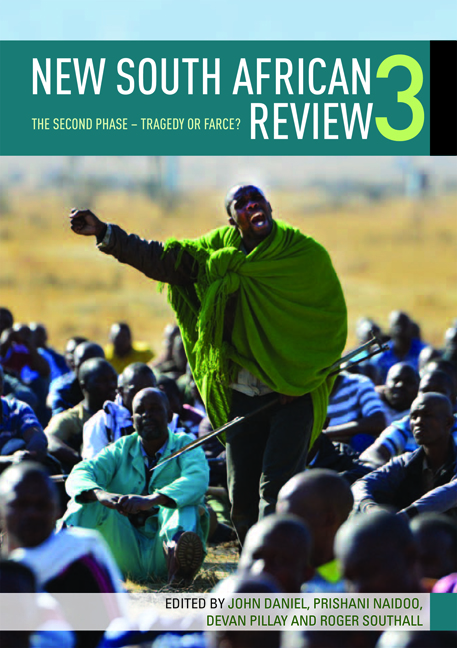Book contents
- Frontmatter
- Contents
- Preface
- Introduction: The second phase – tragedy or farce?
- PART 1 Party, Power and Class
- Introduction: Party, power and class
- Chapter 1 The power elite in democratic South Africa: Race and class in a fractured society
- Chapter 2 The ANC circa 2012-13: Colossus in decline?
- Chapter 3 Fragile multi-class alliances compared: Some unlikely parallels between the National Party and the African National Congress
- Chapter 4 Predicaments of post-apartheid social movement politics: The Anti-Privatisation Forum in Johannesburg
- PART 2 Ecology, Economy and Labour
- PART THREE Public Policy and Social Practice
- PART 4 South Africa at Large
- Contributors
- Index
Chapter 4 - Predicaments of post-apartheid social movement politics: The Anti-Privatisation Forum in Johannesburg
from PART 1 - Party, Power and Class
Published online by Cambridge University Press: 31 May 2019
- Frontmatter
- Contents
- Preface
- Introduction: The second phase – tragedy or farce?
- PART 1 Party, Power and Class
- Introduction: Party, power and class
- Chapter 1 The power elite in democratic South Africa: Race and class in a fractured society
- Chapter 2 The ANC circa 2012-13: Colossus in decline?
- Chapter 3 Fragile multi-class alliances compared: Some unlikely parallels between the National Party and the African National Congress
- Chapter 4 Predicaments of post-apartheid social movement politics: The Anti-Privatisation Forum in Johannesburg
- PART 2 Ecology, Economy and Labour
- PART THREE Public Policy and Social Practice
- PART 4 South Africa at Large
- Contributors
- Index
Summary
INTRODUCTION
In May 2012, the authors received an invitation to attend a meeting ‘to discuss where do we take the APF?’ (McKinley, e-mail communication, 3 May 2012). Subsequently, we met as a small group on the stairs of Museum Africa in Newtown one Sunday morning. Present were about fifteen men and women, including founding members and activists from later struggles. There was, however, no easy path forward, and the discussion turned on whether or not the APF should ‘be revived’. For some of us, revival made no sense. The APF belonged to a different time, and what was needed was a new form to bring together communities in struggle. The elected office bearers had also not met in over a year, and were tainted by accusations of corruption. Rather than trying to resurrect a name that we had long outgrown, or trying to clean up the mess left by the office bearers, our task should be to think about ways of bringing back together the existing struggles of the communities in which the APF operated, or those that have been emerging since its departure from the political realm. For others, however, the APF's death could not be accepted (or admitted) as local struggles had depended heavily on its knowledge, skills and other resources. ‘The APF had a name’ and that meant something: it was too much simply to walk away.
Twelve years earlier, in a precinct close by, the APF held what would later come to be seen as one of its first protests. At that time, there was the idea, and anticipation, that an emerging campaign against privatisation would be transformed into a movement. Activists from Wits University and the city had come together to protest against a conference called Urban Futures that was showcasing the city's and the University's respective restructuring plans. Denouncing the ‘neoliberal policies’ (APF 2000a; 2000b) of the University and the city, on the last day of the conference (after a week of smaller actions), a group of about a hundred protesters from a range of organisations across the city pushed their way into the Wits Great Hall, taking over the closing session. And so the APF was born.
- Type
- Chapter
- Information
- New South African Review 3The second phase - Tragedy or Farce?, pp. 76 - 90Publisher: Wits University PressPrint publication year: 2013

